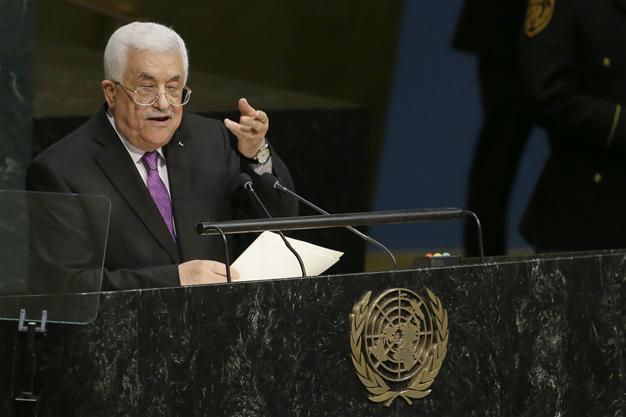Abbas threatens to upturn peace deals, but results unclear
JERUSALEM - Agence France-Presse

Palestinian President Mahmoud Abbas addresses the 70th session of the United Nations General Assembly on Wednesday, Sept. 30, 2015 at U.N. Headquarters. AP Photo
Mahmud Abbas's UN declaration that he is no longer bound by accords with Israel has the potential to upturn what remains of the peace process, but there are doubts whether concrete actions will follow.
His speech on Sept.30 at the United Nations General Assembly was seen as both an attempt to draw renewed focus to the Palestinian cause as well as a bid for leverage at a time when the world's attention is focused elsewhere.
Pulling out of previous agreements, including the landmark Oslo accords of the 1990s, could mean drastic moves such as dismantling the Palestinian Authority or ending security coordination with Israel.
The Palestinian president, who reportedly vowed ahead of his speech that he would drop a "bombshell" at the UN, mentioned none of those details, however.
"They leave us no choice but to insist that we will not remain the only ones committed to the implementation of these agreements, while Israel continuously violates them," he said.
"We cannot continue to be bound by these signed agreements with Israel and Israel must assume fully all its responsibilities as an occupying power."
On Oct.1, senior Palestinian official Mustafa Barghouti reiterated Abbas's declaration in an interview with AFP, saying the "Oslo accords are over. So are the rest of the agreements with Israel."
Another official, Ahmed Majdalani, told Palestinian radio that "arrangements" will be made when Abbas returns from New York.
EU foreign affairs chief Federica Mogherini said she understood Abbas's declaration to be a conditional statement depending on Israel's actions.
"There is an if, and on that if we are going to have to work," she told reporters, while also saying the speech underscored the "urgency" to act now.
While laying out his argument at the UN, Abbas presented a bleak picture, pointing to the continued occupation of the West Bank, settlement expansion and Israel's blockade of the Gaza Strip.
He also spoke of the July 31 firebombing of a Palestinian home by suspected Jewish extremists that killed an 18-month-old boy and his parents.
Meanwhile, peace talks remain moribund and Palestinian statehood is a long way from being realised.
The Palestinian Authority was created by the Oslo accords as a temporary governing administration designed to be in place for five years, when a final agreement would be negotiated. Instead, two decades have now passed.
Still, while Abbas's speech reflected Palestinian frustration, it contained few details.
"It's very hard to know what it would mean in practice, and the reason for that is because I don't think that's what it is about," said Jonathan Rynhold of the Israeli-based Begin-Sadat Centre for Strategic Studies. "It's about sending a signal."
According to Rynhold, "the reason he keeps making these threats is to get the attention of the world because at the moment the world is more interested in ISIS [referring to the Islamic State of Iraq and the Levant] and in Iran. The Palestinians have gone way down the ladder of priorities."
Taking a step such as ending security cooperation with Israel could lead to chaos in the West Bank, Rynhold said, while pointing to the Gaza Strip, where the Islamist movement Hamas is now in power.
There is also the risk that it could provoke a total reoccupation of the West Bank by Israel, although some question whether it would be willing to commit the necessary money and manpower to do so.
The so-called Middle East Quartet, including the United States, Russia, the European Union and the UN and intended to act as a mediator in the conflict, met on Wednesday and "decided to revitalise" its activities, Mogherini said.
She pointed to the clashes in recent weeks at the sensitive Al-Aqsa mosque compound in Jerusalem and the danger of a "dramatic inflammation".
Mogherini called on Israel to implement existing agreements and for the Palestinians to engage in direct negotiations.
For Abbas, who has pushed for a multilateral process and saw the Palestinian flag raised for the first time at the UN on Sept.30, "it is no longer useful to waste time in negotiations for the sake of negotiations".
